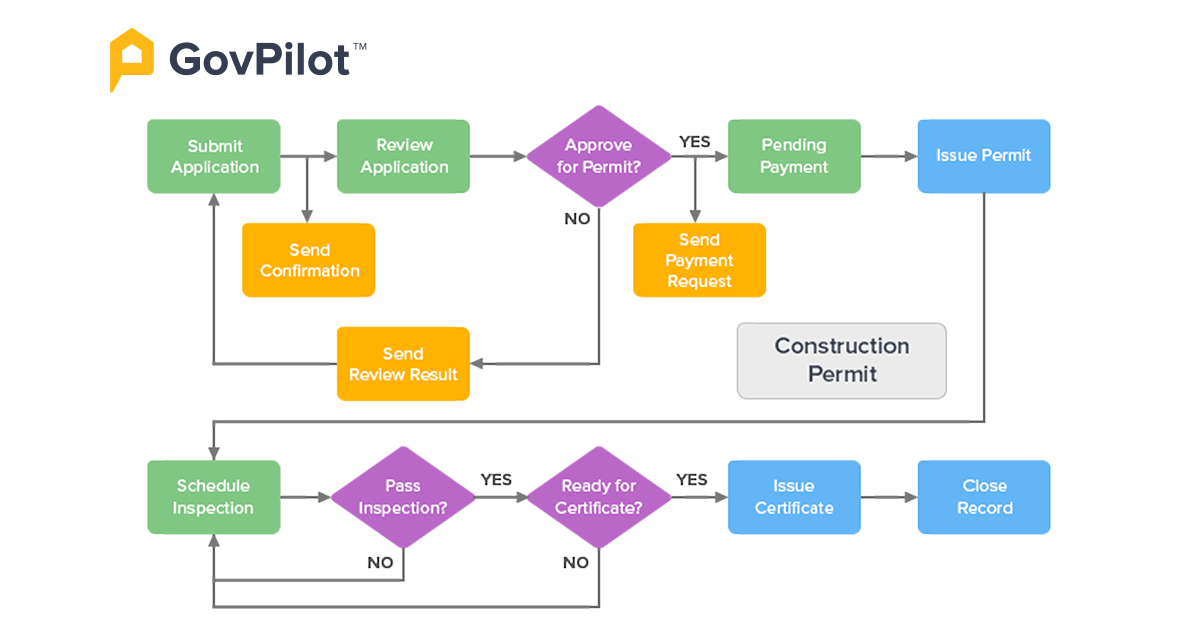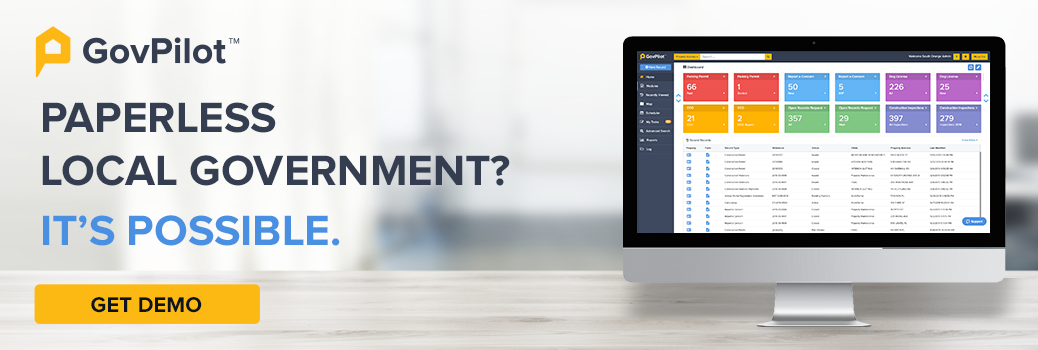At a time when municipal governments are having more difficulty filling employee roles than ever before, and constituents increasingly expect online services, automation is a smart, modern option to keep municipalities operating efficiently despite roadblocks or a lack of employee manpower.
Robotic process automation (RPA) is the future of local government, with the power to eliminate thousands of man hours a year of manual data entry, and reduce your municipality’s expenses drastically. But how exactly does public sector RPA work? And how can your municipal leadership take action as an innovator by implementing across your departments?
Follow along for everything you need to know about municipal RPA and the many ways that modern government management software can improve government workflows.
What is Robotic Process Automation?
As the name implies, robotic process automation,often referred to as RPA, is the process of using robotic software technology to automate digital tasks and replace manual processes with digital best practices.
Just like people, these robots are able to leverage a computer screen, keyboards, online systems, and data to get work done for a business or government entity without the labor cost or risk of human error.
Using machine learning, this technology has the promise to expedite many of the slow-moving bureaucratic processes by automating mundane tasks like filing paperwork or entering data with software ‘robots.’
Data transparency is also increased as a digital record of applications, approvals, payments, and permits are automatically stored for safety in the cloud. With RPA handling simple but time-consuming tasks, municipal workers can spend their time on more important work. For governments struggling to recruit new public workers, these systems can replace certain administrative roles altogether, thereby saving money for government budgets and allocating more funds to improve constituent services.
How Does Robotic Process Automation Work?
With RPA, your local government can leverage software that automates government functions across your municipality. Software ‘robots’ are designed to rapidly accomplish simple but traditionally time-consuming tasks. Work related to administrative data-entry and reporting roles that previously required hours to complete can now be done by a robot software in significantly shorter periods of time.
How Can Local Governments Automate Workflows?
You may be wondering, what specific tasks can RPA automate for my local government? Government management software wields the power to automate workflows across governmental departments.
Here are some of the ways that your local government can automate manual tasks:
1. Digital Permitting & Report-a-Concern
With online permitting software, residents can file relevant permits related tobuilding and construction, zoning, and parking at any time via your government website. Once a permit is submitted, this software will automatically store the documentation in the government cloud, providing access to any internal government employees that need to review it, and the software will automatically be able to receive direct payment for permit application fees.
Clerk's department employees no longer need to focus on manually filing paperwork or tracking down the relevant government workers to submit paperwork for review. Now the seemingly endless process of filing paperwork is streamlined and simplified for your clerk's department employees (who will surely be appreciative of their newfound time to dedicate to more pressing tasks).
- In Sea Girt, NJ, the municipal government reported an 80% time-saving on zoning permit data-entry after switching to GovPilot, showing just how much time savings can be achieved through this software.
Utilizing RPA, local governments can make their citizens helpful eyes and ears by enabling them to instantly report non-emergency concerns through the government website or via the GovAlert mobile app. Automation will route the constituents' concern reports to the relevant department depending on the category of concern. This automatic routing of the concerns to the appropriate government department ensures a pothole complaint will go directly to the DPW while a complaint of a neighbor's overgrowth will go to the Code Enforcement Department; all with time stamps and automated communication for full transparency and accountability.
2. Digital License Registration
Similarly to permit registration, constituents and business-owners now wield the power to file for licenses online, at any time. License requests will be automatically accessible from the cloud, meaning municipal workers can approve or deny requests directly from the software application no matter where they’re working from.
Here are a few license registration forms that can go digital:
- Business registration: Improve business-relations with your local government by giving business-owners the ease to file paperwork online and government officials to quickly find contact information of owners.
- Pet licenses: Allow constituents to register their cats and dogs directly.
- Volunteer registration: promote civic engagement by allowing volunteers to apply on your government website with ease.
- Contract Management: Local governments work with a number of vendors and contractors every year. Automated workflows can help organize and manage all contracts so that the government can function efficiently and remain cost effective.
3. Mobile Building Inspections & Construction Permits
Digitizing and automating the building inspection process with a mobile application like GovInspect can be helpful in saving inspectors time and generating more visible, actionable data. With GovInspect, inspectors can complete the full inspection process digitally on mobile field devices such as tablets or even smartphones, and records will automatically update across the cloud-based system so that colleagues back in the office can access updated records and permits in real time.
Improving these workflows and processes will be essential in enabling building code officials to ensure all structures and new construction are in good condition - especially as climate change and aging infrastructure drive the need for disaster resilient architecture in communities nationwide.
Learn more about leveraging government data analytics in our guide.
4. Court House RPAs
Your local courthouse has the potential to drastically reduce the amount of time spent on administrative tasks with court management software.
If a constituent requests court records, court-hearing transcripts, or records through a FOIA request, robots can automatically send out the relevant documentation, saving a municipal worker time on the task. When a person seeks to appeal a court decision or expunge a criminal record, online applications will automatically get them on the relevant waiting lists without having to drive to the courthouse.
Why Should Your Local Government Leverage Robotic Process Automation Now?
With electronic permitting laws being passed in states like New Jersey and Florida back in 2021, the writing is on the wall that local governments will be going through a digital revolution in coming years. The pandemic drove home the necessity for local governments to provide online digital services to constituents and enable remote work for their employees via a cloud-based local government management software platform.
Here are a few reasons you should get ahead of the curve by leveraging RPAs now:
-
Saving time and money across departments
With manual workflows, your government’s need for people to perform tedious manual administrative tasks will be reduced substantially, saving you money on recruiting new employees and paying salaries. Administrative departments have reported taking just a few days to learn and feel comfortable with government management software, meaning that they’ll save time in their day to day and be able to focus on important project management for higher level initiatives, while RPAs take on the bulk of manual, straight-forward yet time consuming tasks.
Easier access to constituent services like permitting and business registration directly from your government website, will contribute more in application and registration fees. This will enable constituents to contribute to the community's quality of life, property valuations, and business development - all of which are great for your local economy.
-
Collect insightful data about constituents and public sector processes
While robots automate tasks, the software will simultaneously collect insightful data. With more constituents filing permits and applying for licenses, your software will be able to provide insightful dashboards and instant reporting about which permits and licenses are a top priority within your community. Internally, you'll be able to see where time is being saved and make decisions on what types of innovation should be prioritized internally to reduce municipal communications, data, and operational bottlenecks. -
Build trust with constituents
With the accessibility to file paperwork online, and reduced amount of time it will take for government workers to approve and deny applications, constituents will make note of the government innovations and have more faith in their local government officials. Performing tasks for constituents in a timely manner does strides for promoting positive thoughts on their local government.
To learn more about improving your municipality’s relationship with constituents, read on in our How to Improve Trust in Local Government and How to Improve Civic Engagement guides.
-
Increased collaboration
With relevant documentation, data, and records stored in the cloud, municipal workers across departments can access paperwork and collaborate with ease, eliminating traditional, unnecessary obstacles caused by paper-based processes and single use software.
Learn more about How Local Governments Can & Should Use the Cloud.
Embrace Robotic Process Information for Local Government
Overall, it is clear that a digital transformation is inevitable for businesses and local governments around the world, now you have the opportunity to reap the benefits of this government modernization. The ability to automate tasks with RPAs, governments can address understaffed, overworked departments, spend less time recruiting government workers, and eliminate inefficient manual processes. This will greatly enhance the citizen experience and vastly improve the local government workplace, ensuring that municipalities and counties operate with increased productivity, efficiency, and transparency for decades to come.
To learn more about saving time and money with cloud-based government management software, book a consultation.
Public Sector RPA FAQS
- What is RPA?
To put it simply, Robotic Process Automation (often referred to as RPA) is software that is designed to accomplish simple-tasks that formerly needed to be done by the human workforce. Typically, these tasks are related to clerical work and data-entry for businesses and government agencies or perform tasks that are tedious and time consuming to save manpower and resources for municipal workers.
- Why Should The Public Sector Use Robotic Process Automation?
Intelligent automation will free up time and money across governmental departments. Eliminating paper documents in exchange for cloud-based software means that important documents will be automatically accessible to any relevant government worker.
Furthermore, the customer needs and expectations of constituents have advanced dramatically in recent years. As consumers, constituents expect to be able to conveniently conduct business and get services online. They shop, bank, book travel, and more all online and now expect that their local government and other agencies also provide a fully digital experience.
- How Can Local Governments Afford to Automate?
Fortunately, federal legislation has paved the way for municipal governments to affordably go digital. With the passage of the American Rescue Plan, the federal government granted local governments the ability to spend federal funds on improving digital infrastructure. Similarly, the 2021 Infrastructure Bill is poised to offer notable grants for improving access to technology for municipal governments.
Learn more about best practices for budget planning in your local government.
Read On:
- Should The Public Sector Use the Cloud or In-House Servers
- Government Cybersecurity: How to Prevent Ransomware Attacks
- Municipal Planning: Reclaiming Your City Streets
- How Local Governments Should Be Leveraging Social Media
- Local Government ADA Compliance Check-List
- Municipal Planning: Reclaiming Your City Streets
- Local Government Wildfire Mitigation & Disaster Plan
- Local Government Flood Mitigation & Disaster Plan
- How to Build a 15-Minute City
More Resources About Robotic Process Automation






